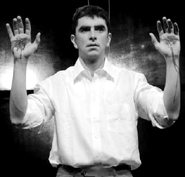February marks the dawn of a new theatre festival at the Southern Repertory Theatre found in the Shops at Canal Place. The Southern New Plays Festival, as it’s called, is an attempt to bring to life the creations of various playwrights from New Orleans and surrounding areas.
The first in this series of new theatre is a play written by Loyola’s own John Biguenet, English professor. No stranger to having his work published and performed, Biguenet’s brainchildren have been seen in publications such as The New York Times Book Review, The Washington Post and Esquire.
This play, entitled “The Vulgar Soul,” follows Thomas Hogue (Barret O’Brien), a middle-class, middle-aged man, as he is plagued by/blessed with the stigmatic wounds of Christ’s Passion. The drama unfolds as the effects of his marks take their toll on his life, bringing to the scene the question of whether or not this miracle can be viewed as a gift or a curse.
Biguenet opens a forum of discussion that deals with the way in which people can find religious faith in the unexplained events that break the monotony of everyday life. Hogue, being an agnostic bordering on atheism, finds it harder to believe that his wounds are gifts from God than the people surrounding him.
But the notion is pressured upon him, initially by both his physician and his psychiatrist, then by religious groups, and he allows himself to become the center of attention as fanatics market him as an object from which faith is derived. This unfortunately leads to a pattern of destruction in not only his health but his strength of
character.
There are various reactions to the stigmatic marks that Hogue receives, showing the vast differences in how human nature reflects on such an occurrence.
Some of the characters are disheartened and filled with jealousy at the fact that a non-believer would receive such a blessed sign, while others realize the damage that the constant pain and loss of blood is doing to Hogue’s body, worrying more about him as a person, rather than as a spectacle. Still others are more concerned with the meaning of the marks and give no thought to Hogue whatsoever.
Hogue himself is stricken with a dilemma of his own. He initially is nervous about the mass attention that his wounds draw toward him, and he is turned off by the idea of becoming a religious figure. But he sees the responsibility that his wounds have given him when he comes to understand that his marks, whether miraculous or not, inspire hope within others.
The theatrical aspects of the performance had elements of Medieval Theatre, which comes as no shock because in the Middle Ages theatre was written and performed by the clergy. As in the days of presentations centuries ago, there was very little in the way of set design, and yet a chair here and a table there were more than enough to depict a change of setting.
There was also music played between each scene: the chanting of Gregorian Monks or the strumming of strings like that of Sir Robin’s minstrel as he runs away in “Monty Python.
This play continues at Southern Rep. until March 13 with performances every Thursday through Saturday at 8 p.m. and Sundays at 3 p.m. Free student matinees are performed Wednesday at 10 a.m.
Colin Lacy can be reached at cjlacy@loyno.edu.






